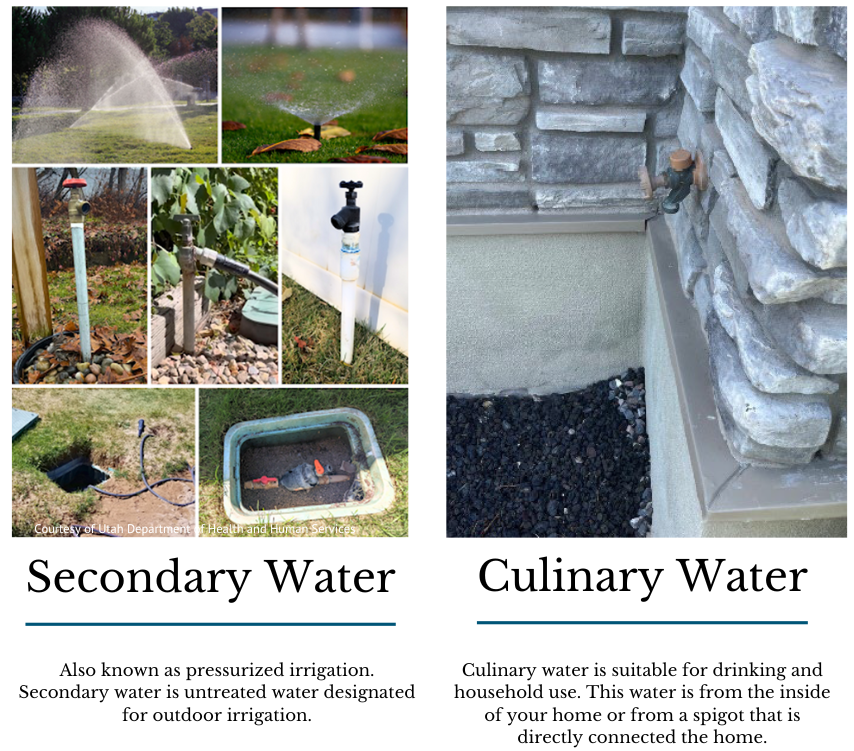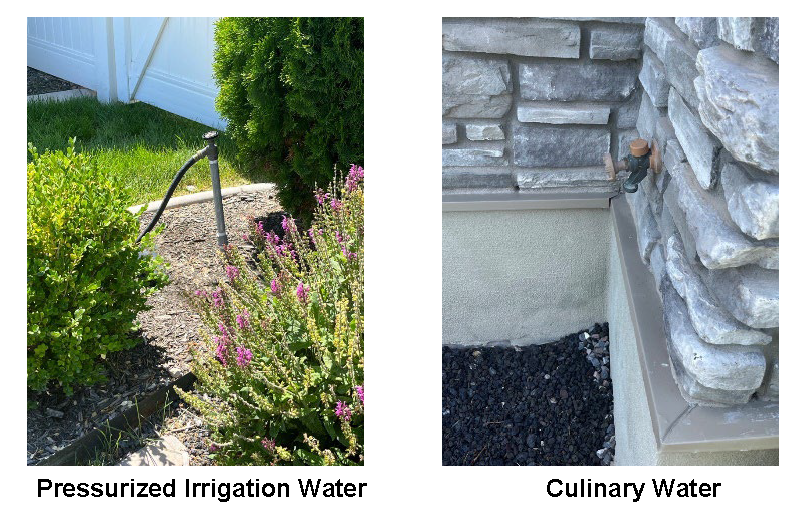- Pay Utility Bill
- Search

E. Coli Information
While culinary water is suitable for drinking and household use, secondary water (also known as pressurized irrigation/ PI) is designated for outdoor irrigation. It’s essential to keep this distinction in mind to ensure the efficient and safe use of our water resources. Unlike the City’s culinary water system, pressurized irrigation water is not treated, making it vulnerable to contamination and harmful bacteria.
In the late summer of 2023, Utah County Health Department reported 13 cases of E. coli O157 in Lehi. The investigation linked the source of the cases to using pressurized irrigation for drinking and recreation, such as running through sprinklers or playing on slip-n-slides, bounce houses, kiddie pools, and outdoor water tables. There was no evidence that the cases came from gardening or incidental exposure such as, playing in the grass or on a play structure.
*Secondary water is not protected and may become contaminated at the source, during storage, or along its route to your house. Many times, secondary water is uncovered (open water) and exposed to the environment, which makes it vulnerable to harmful germs or chemicals. It is not tested to verify its quality. This is very different from drinking water. Drinking water is protected all the way from its source to your home. Everything possible is done to protect the source, the storage facilities, and the distribution system from contamination that could be harmful to health. *Source: Utah Department of Health & Human Services

For more information on secondary water safety, visit SecondaryWaterSafety.utah.gov.
FAQs
Has the E.coli problem been resolved in the Lehi irrigation water?
Last fall, our Water Department took the sedimentation basin of the Sandpit Reservoir out of service, cleaned it and sanitized it. Since pressurized irrigation water is not treated, there’s always a high chance of bacterium, such as E. coli, being present. This type of water was never meant to be consumed or played with. We ask residents to use caution when handling PI water because of this.
LAWNS
-
How do I know if my water is pressurized irrigation water or culinary water?
- Spigots directly connected to your home are culinary water.
-
Can you drink from the hose and play in the sprinklers?
- Never drink or play in PI water. Unlike culinary water, pressurized irrigation is not commonly treated, making it vulnerable to contamination and harmful bacteria, such as E. Coli.
-
Can residents use their drip system for watering the garden? What are the alternatives?
-
- Produce watered with drip systems can pose a health risk if consumed uncooked. Residents should cook all produce grown using PI water to 160 degrees Fahrenheit.
If you have questions about watering your garden or eating produce from your garden, please visit this article from USU Extension (https://extension.usu.edu/archive/should-i-wish-my-fruits-and-vegetables).
-
-
Can residents walk on the lawn or do recreational activities when the lawn is dry?
- E. coli can make you sick when it gets in your mouth. Simply walking across a lawn won’t make you sick, but keep in mind that pathogens might get on your shoes as you walk and could then spread from shoes to other surfaces.
- Young children often put their hands or objects in their mouths that could make them very sick. Residents with young children should reconsider recreational activities on lawns.
- E. coli can be present on lawns, even when the lawn is dry.
- Practice good hygiene
- Thoroughly wash hands to prevent the spread of E. coli and other bacteria.
-
What about pets? Can pets play in the yard still?
- Pets should not drink or play in PI water.
- E. coli O157 doesn’t generally cause illness in pets, but pets can shed O157 in their feces that could make people sick.
- Additionally, other pathogens may be present in PI water that could make pets sick.
- Pets can go out in the yard, but pets might get pathogens on their paws and fur, and pet owners should exercise caution, including washing their hands after touching or cleaning up after their pets, so that bacteria does not spread from pets to humans.
-
Will UV kill E. coli?
- While UV can kill E. coli, it should not be relied on to make produce or water safe to eat or drink. E. coli can live in many places in soil and plants that are hard for UV to reach.
gardening
Source: Utah Department of Health & Human Services
-
Is it safe to use secondary water to water my vegetable garden?
We don’t know. Germs that can be in secondary water have been known to contaminate fresh produce and make people sick, but we don’t know if this happens specifically in home gardens.
Anyone can get sick, but children younger than age 5, adults 65 years and older, and people who have weakened immune systems are more likely to get severely sick. If you’re worried about the risk, consider taking precautions, such as cooking home-grown produce or washing it with drinking water before you eat it.
-
How can I stay safe if I choose to use secondary water in my garden?
If you decide to water your garden with secondary water, consider using a drip irrigation system to minimize any potential risks.
The safest produce to eat is cooked; the next safest is produce washed with drinking water. Consider cooking your produce before you eat it.
Keep produce in the refrigerator to prevent germs from growing on or in your fruits and vegetables.
-
Can’t I just wash my produce?
We recommend you wash your fruits and vegetables with drinking water before you cut or eat them, even if you don’t plan to eat the peel. This can get rid of some of the germs on the outside that could make you sick. Gently rub produce while you rinse it and use a vegetable brush to scrub firm produce, such as melons. There is no need to use produce wash or soap.
However, germs from secondary water could also get inside your fruits and vegetables and make you sick, even if you wash them. Thoroughly cooking your produce will kill germs that might be inside.
Resources for more information about gardening and produce safety:
- Drip irrigation system: https://extension.usu.edu/yardandgarden/research/designing-a-basic-pvc-home-garden-drip-irrigation-system
- Safe produce: https://www.cdc.gov/foodsafety/communication/steps-healthy-fruits-veggies.html
- Washing fruits and vegetables: https://www.fda.gov/consumers/consumer-updates/7-tips-cleaning-fruits-vegetables
Summer 2023 INVESTIGATION QUESTIONS
-
Where was the bacteria found?
- E. coli O157 bacteria was found at multiple locations in the pressurized water system, including the sediment of a reservoir and at some of the identified patient’s homes.
-
What did the City do to mitigate the E. coli?
- Upon being informed by the Utah County Health Department of the first cases of E. coli, Lehi City Water Department pulled 7 investigative samples from the drinking water system at or around the known PI exposure sites, these 7 samples were in addition to the 20 routine bacteria samples that are pulled weekly from the drinking water distribution system. The sample results from all 7 of these samples were clean and confirmed that E. coli was not present in the culinary drinking water system.
- The Water Department created a treatment strategy for the PI system.
- Crews shock treated two of our key reservoirs, with one receiving a steady rate dosing. This treatment is designed to help deactivate and lower the levels of bacteria.
- A sampling strategy to monitor the effectiveness of the treatment in the system has been implemented by the Water Department.
- Each fall, our dedicated staff cleans sedimentation basins and reservoirs to remove any accumulated debris or sediment. This routine maintenance includes cleaning at various locations such as the:
- Sandpit Sedimentation Basin
- West Side Sedimentation Basin
- Pilgrim Reservoir
- Oak Hollow Reservoir
- Seasons Reservoir
E. COLI SYMPTOMS
- If you see or notice any of the following symptoms, contact a Health Provider:
- Bloody diarrhea
- Persistent diarrhea
- Fever
- Nausea
- Vomiting
- Symptoms usually start 3 to 4 days after swallowing the bacteria and last 5 to 7 days.
- E. coli can be transmitted from person to person. Good handwashing and hygiene are necessary to prevent the spread.
- Anyone can get sick. Children younger than 5 years, adults 65 years and older, pregnant people, and people with weakened immune systems are more likely to get seriously ill. This demographic is also more likely to have hemolytic uremic syndrome (HUS), a type of kidney failure.
COMMUNICATION EFFORTS
Past communication efforts related to the 2023 E.coli O157 Outbreak.
More Information
Send questions to, communityhealth@lehi-ut.gov
To receive up-to-date city notices and emergency alerts, visit Everbridge Alerts.


